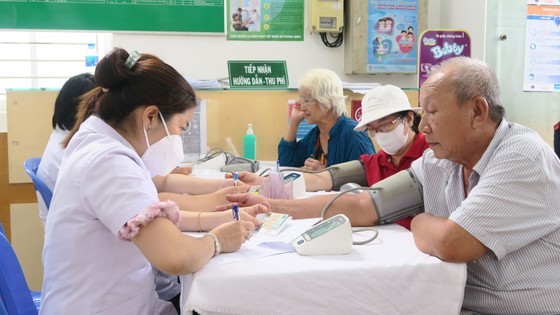 |
The city's health sector provides medical checkup for elderly citizens to help them live healthily |
From 2022, the number of people over 60 years old in Ho Chi Minh City will be 1.033 million, accounting for 11.03 percent of the total population of Ho Chi Minh City - a milestone marking Ho Chi Minh City officially going into the aged population.
Starting from mid-August 2023, Thu Duc City and districts have implemented pilot free health check-ups for senior citizens. This is a part of the plan for health examination and early detection of non-communicable diseases in the elderly across the city in the period 2024-2025 and the following years issued by the municipal People's Committee. Specifically, about VND150 billion (US$6,275,365) are taken from the city budget annually for health check-ups for about one million elderly people to detect and control chronic diseases well and save treatment costs.
Many older people at medical check-up venues were very excited to undergo healthcare check-ups. 70-year-old Nguyen Thi Huong in Ward 9 of District 8 said that before, she only went to see a doctor when she was sick but she now receives a free-of-charge examination. She revealed that after she was examined, she was taken blood for testing and then she underwent ultrasound and X-ray.
Statistics from the Ho Chi Minh City Social Insurance show that currently, there are about 250,000 pensioners and social allowance brackets in Ho Chi Minh City, while 1,033 million people are over 60 years old citywide. Thus, a large number of older people who do not have a pension still have to depend on their children and grandchildren or struggle to make a living.
Head of the Representative Committee of the Ho Chi Minh City Elderly Association Huynh Thanh Lap said that in addition to those with a stable pension and economy, many older people still do not have a good quality of life. Some people even have to do heavy manual work to make a living, such as helping with housework, babysitting, or carrying heavy objects.
Therefore, it is necessary to change the concept and attitude of society about the aged population and oldies. It should recognize that the elderly are not a burden to society but members who make positive contributions to society with the aim to encourage them to participate in activities appropriate to their health and age. In particular, it is necessary to create suitable employment opportunities for the elderly as a method of ensuring income and welfare, especially for the elderly who do not have a pension or low pension.
According to the Department of Population and Family Planning in Ho Chi Minh City, the proportion of the elderly in the area is increasing at a fairly rapid rate in recent years. In 2019, the number of elderly people in Ho Chi Minh City only accounted for 9.3 percent of the total population of Ho Chi Minh City, but in 2022, it increased to 11.03 percent.
Director of the HCMC Sub-Department of Population and Family Planning Pham Chanh Trung pointed out that the low birth rate, the declining death rate, and the constantly improving life expectancy are the culprit of a high rapid population aging. Currently, the population aging index of Ho Chi Minh City is at 49.4 percent, nearly 1 percent higher than the national average. According to the population transition model, people over 60 years old ranging from 10 percent to 20 percent are called the aging population, and if this rate exceeds 20 percent, they become an aging population.
With the current increasing rate of the aging population, many people fretted that Ho Chi Minh City will face the risk of becoming a locality with the earliest aging population in the country. This is a significant economic and cultural challenge for individuals, families, society and communities because it not only poses the risk of future labor shortages, and population aging but also increases pressure on the health care system and the social protection, health care, and entertainment system, said Mr. Pham Chanh Trung.
Voicing his opinion about Vietnam’s increase in elderly people, Deputy Director General of the Ministry of Health’s Department of Population and Family Planning Pham Vu Hoang commented that the rapid increase in the aging population means a decrease in the labor force; thereby, it will inhibit labor productivity. On the other hand, the elderly population tends to use more medical and healthcare services, putting great pressure on the health system.
On average, healthcare costs for an older person are 7-8 times higher than that of a young person. Therefore, when the number of older people increases, the pension and social security systems will face great pressure.
Associate Professor Le Dinh Thanh said that an elderly person on average has 2-3 chronic diseases that require regular care and treatment. The diseases of the elderly often affect each other, one disease becomes risk of aggravating the other, so if retirees don’t receive proper treatment and care, they may become disabled people - a burden for their families and society.
























